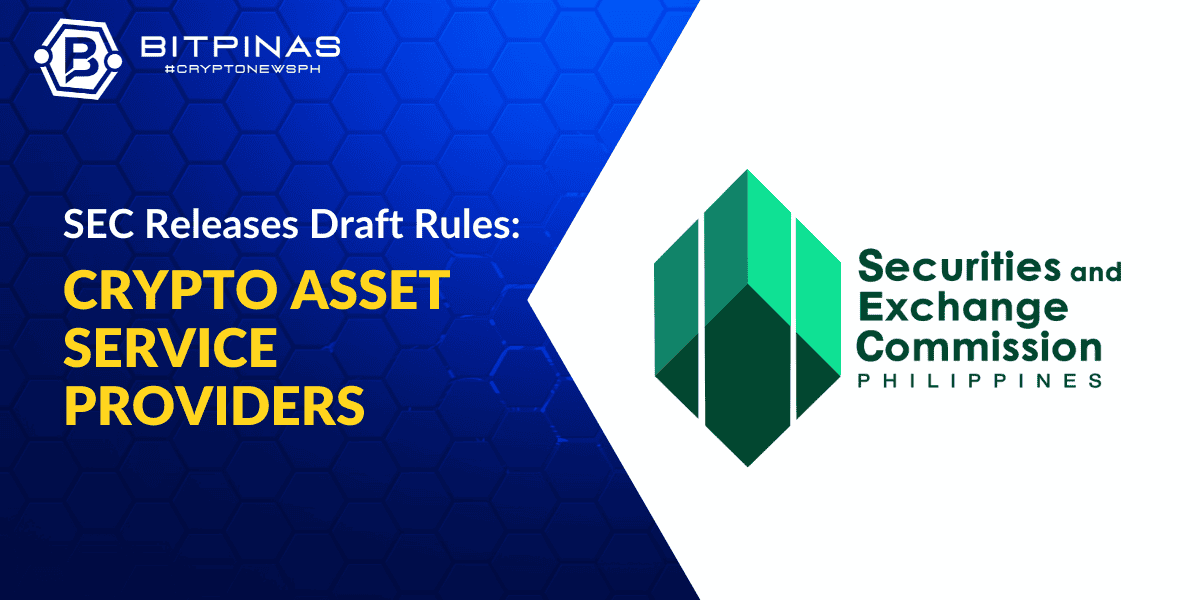The Philippines’ Securities and Exchange Commission (SEC) has released a draft of the “SEC Rules on Crypto-Assets Service Providers” (CASP), aiming to establish a robust regulatory framework for entities offering crypto-related services.
What’s the significance: The SEC is seeking public feedback on its proposed rules before January 18, 2025.
Below is BitPinas’ summary and key takeaways from the SEC draft rules on crypto asset service providers:
Key highlights of SEC Draft Rules for Crypto Asset Service Providers
Coverage and Applicability
The rules will apply to all entities offering crypto-asset services in the Philippines or impacting its markets.
Registration Requirements
All CASPs to secure a license before operating in the Philippines.
Minimum qualifications include:
- Incorporation as a stock corporation registered with the SEC.
- At least four local staff members.
- Compliance with capital requirements set by the SEC.
Applications must demonstrate the ability to meet ongoing regulatory obligations.
The SEC has the authority to amend requirements and impose a moratorium on licensing.
Public Offering of Crypto-Assets
Public offerings must comply with extensive disclosure requirements, including:
- Detailed information about the issuer and the crypto-asset.
- Risks, obligations, and key features of the asset.
- Technical details about the underlying blockchain or protocol.
Mandatory warnings include:
- The crypto-asset may lose value entirely.
- It may not be liquid or transferable.
Exemptions exist for:
- Free distributions (airdrops).
- Rewards for blockchain maintenance or transaction validation.
- Tokens used exclusively within a closed network of merchants.
Public Offering of Crypto-Asset Securities
Crypto assets are classified as securities if they meet the definition under the Securities Regulation Code (SRC).
- Requires a registration statement filed with and approved by the SEC.
- Includes Initial Coin Offerings (ICOs) that function as securities.
Admission to Trading
Trading on exchanges or platforms must meet requirements in previous sections.
Crypto asset service providers are prohibited from:
The SEC shall have the power to order the removal of a crypto-asset in a crypto-asset exchange, in the interest of investor protection.
SEC Draft Rules
Marketing and Promotion
Marketing is broadly defined to include social media, events, paid media, and educational content.
Unauthorized entities are barred from promoting crypto-assets.
Marketing materials must:
- Use plain and clear language.
- Accurately disclose risks without being misleading.
CASPs are responsible for their agents’ and third-party marketers’ compliance with rules.
SEC AML Rules Compliance
CASPs are “covered persons” under the Anti-Money Laundering Act (AMLA).
The draft rules obligates compliance with AML, Countering the Financing of Terrorism (CFT), and Counter-Proliferation Financing (CPF) laws.
Continuing Obligations of CASPs
CASPs must:
- Maintain systems to detect and report market abuse.
- Implement surveillance and cybersecurity measures.
- Conduct annual effectiveness reviews of their systems, especially after launching new activities.
Prohibition on Market Manipulation, Insider Trading, and Unlawful Disclosure
Banned activities include:
- Artificially inflating or deflating prices (e.g., wash trading, painting the tape).
- Sharing material non-public information for trading advantage.
CASPs must keep insider lists and ensure employees do not misuse confidential information.
Adoption of a Cybersecurity Framework
CASPs are required to adopt cybersecurity measures aligned with the National Cybersecurity Plan and global best practices.
CASPs must ensure compliance with SEC-issued cybersecurity guidelines.
Audit and Review
SEC will conduct audits of CASPs to assess compliance with rules, cybersecurity measures, and risk management systems.
Enforcement Power of the SEC
The SEC can:
- Investigate violations and impose fines or suspensions.
- Issue cease-and-desist orders for fraudulent or harmful practices.
- Revoke licenses after due process if violations persist.
Confidentiality is maintained for investigations until formal actions are taken.
Grounds for Suspension or Revocation of license
Grounds include:
- Misrepresentation or false statements in applications or disclosures.
- Failure to comply with rules or address violations.
- Fraudulent activities or unauthorized operations.
The SEC had outlined the process for suspension or revocation, including hearings. The Commission said the suspensions will be initially confidential unless violations continue.
Liability, Administrative Sanctions, and Settlement Offers
- CASPs are liable for their employees’ and agents’ misconduct.
- Fines range from ₱50,000 to ₱10 million, with additional penalties for continuing violations.
- Settlement offers may be accepted if they serve the public interest.
Penalties and Applicability of Laws
Violations may result in:
- Imprisonment (1–5 years).
- Fines (₱50,000 – ₱2 million).
- Both penalties for individuals and responsible corporate officers.
- These rules supplement the SRC, FCPA, and other SEC regulations where applicable.
- If any rule is invalidated, the remaining provisions will still apply.
What’s next:
- The SEC is inviting comments from stakeholders until January 18, 2025.
- Feedback can be sent via email to [email protected] or through physical mail to their Makati office.
This article is published on BitPinas: Key Takeaways: SEC Draft Rules for Crypto Asset Service Providers in the Philippines
What else is happening in Crypto Philippines and beyond?





